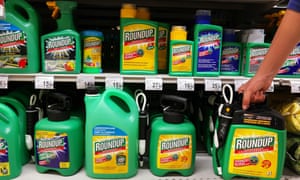EFSA report copied and pasted analyses from a Monsanto study
16 September, 2017
EU report on weedkiller safety copied text from Monsanto study. By Arthur Neslen. theguardian.com.September 15, 2017. EU’s food safety watchdog recommended that glyphosate was safe but pages of report were identical to application from pesticide maker.The European food safety authority (Efsa) based a recommendation that a chemical linked to cancer was safe for public use on an EU report that copied and pasted analyses from a Monsanto study, the Guardian can reveal.Glyphosate is the core ingredient in Monsanto’s $4.75bn (£3.5bn) a year RoundUp weedkiller brand and a battle over its relicensing has split EU countries, with a final decision on its authorisation expected in early November.
 Glyphosate is the core ingredient in Monsanto’s $4.75bn a year RoundUp weedkiller brand. Photograph: Rene van den Berg/Alamy Stock Photo
Glyphosate is the core ingredient in Monsanto’s $4.75bn a year RoundUp weedkiller brand. Photograph: Rene van den Berg/Alamy Stock PhotoThat decision will largely be informed by an Efsa opinion, which is based on a 4,300-page renewal assessment report (RAR) published in 2015.
In June, Efsa said that where the RAR was concerned, “every scientific study is scrutinised for relevance and reliability by EU risk assessors based on the evidence contained within the study”.
But dozens of pages of the paper are identical to passages in an application submitted by Monsanto on behalf of the Glyphosate Task Force (GTF), an industry body led by the company.
These sections analyse peer-reviewed studies into links between glyphosate and genotoxicity (how likely it is to cause cell mutations), carcinogenicity and reproductive damage.
Franziska Achterberg, Greenpeace EU’s food policy director, said: “Whether this is a question of negligence or intent, it is completely unacceptable.
“It calls into question the entire EU pesticide approval process. If regulators rely on the industry’s evaluation of the science without doing their own assessment, the decision whether pesticides are deemed safe or not is effectively in the industry’s hands.”
Efsa insists that it has a “robust, well-balanced independence policy” and that it views the RAR as separate from the authority’s conclusion which follows it. The RAR is prepared by an EU state’s regulator – in this case Germany’s BfR – rather than Efsa itself.
In June, Efsa said that where the RAR was concerned, “every scientific study is scrutinised for relevance and reliability by EU risk assessors based on the evidence contained within the study”.
But dozens of pages of the paper are identical to passages in an application submitted by Monsanto on behalf of the Glyphosate Task Force (GTF), an industry body led by the company.
These sections analyse peer-reviewed studies into links between glyphosate and genotoxicity (how likely it is to cause cell mutations), carcinogenicity and reproductive damage.
Franziska Achterberg, Greenpeace EU’s food policy director, said: “Whether this is a question of negligence or intent, it is completely unacceptable.
“It calls into question the entire EU pesticide approval process. If regulators rely on the industry’s evaluation of the science without doing their own assessment, the decision whether pesticides are deemed safe or not is effectively in the industry’s hands.”
Efsa insists that it has a “robust, well-balanced independence policy” and that it views the RAR as separate from the authority’s conclusion which follows it. The RAR is prepared by an EU state’s regulator – in this case Germany’s BfR – rather than Efsa itself.
